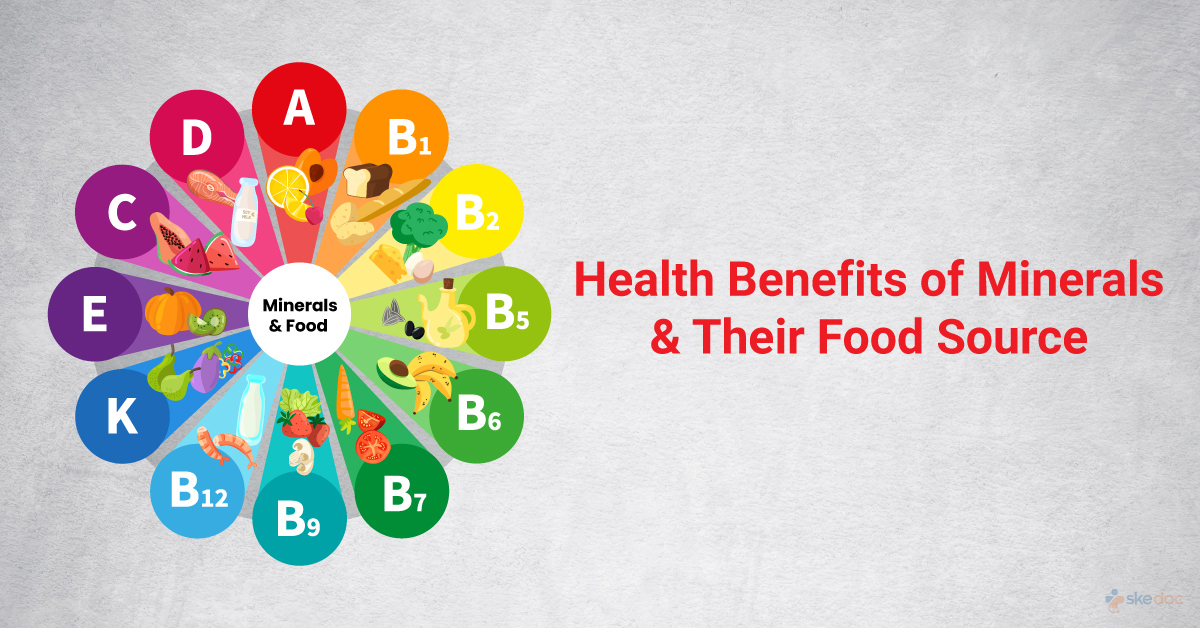Allergy
Blood Diseases
Bone & Joints
Brain
Cancer
Child Care
Cosmetic Surgery
Diabetes
Endocrinology
ENT
Eye
Gen Medicine
General Surgery
Heart
Kidney
Lifestyle
Liver & Digestive
Lung
Men’s Health
Mental health
Physiotherapy
Rheumatology
Skin and hair
Sleep Disorders
Spine
Transplant
Women Health
Thyroid
Vascular Surgery
Health Benefits of Minerals and Their Food Sources

Incorporating a variety of foods rich in minerals is essential for a balanced and healthy diet. While individual mineral needs may vary, focusing on a diverse and well-rounded diet is the key to ensuring adequate intake of these essential nutrients. It's important to note that certain medical conditions or dietary restrictions may require specific mineral supplementation. Consulting with a healthcare provider or a registered dietitian can provide guidance on meeting individual mineral needs while maintaining overall health.
Minerals are essential nutrients that play a pivotal role in maintaining overall health. They involve numerous physiological processes, from bone health to immune function. Understanding the significance of minerals and their food sources is crucial for a balanced diet. In this article, we will explore the health benefits of various minerals and foods that are rich in these essential nutrients.
- Calcium: The Bone Builder
- Calcium is renowned for building and maintaining strong bones and teeth. It is also crucial for blood clotting, muscle function, and nerve transmission. Dairy products like milk, yogurt, and cheese are well-known sources of calcium. However, for those who are lactose intolerant or prefer plant-based options, fortified plant-based milk, tofu, leafy green vegetables (such as kale and broccoli), and almonds are excellent sources of this mineral.
- Iron: Vital for Oxygen Transport
- Iron is essential for the transport of oxygen in the blood. It plays a significant role in preventing iron deficiency anemia, which can lead to fatigue and weakness. Foods rich in iron include lean meats, poultry, fish, beans, lentils, and fortified cereals. Combining these sources with vitamin C-rich foods, like oranges and strawberries, can enhance iron absorption.
- Potassium: Heart and Muscle Health
- Potassium is essential for maintaining proper heart and muscle function. It helps regulate blood pressure and balance body fluids. Bananas are a well-known source of potassium, but this mineral is also abundant in sweet potatoes, spinach, beans, and oranges. Including these foods in one's diet can contribute to optimal potassium intake.
- Magnesium: The Body's Regulator
- Magnesium is involved in hundreds of biochemical reactions in the body, including muscle and nerve function, blood glucose control, and blood pressure regulation. Foods rich in magnesium include nuts, seeds, whole grains, green leafy vegetables, and fish. Consuming a balanced diet that consists of these sources ensures adequate magnesium intake.
- Sodium: Balancing Act
- While sodium is an essential mineral for maintaining fluid balance and nerve function, excessive intake can lead to high blood pressure and other health issues. The main dietary source of sodium is salt, and it's important to consume it in moderation. Processed foods, such as canned soups and fast food, often contain high sodium levels, so it's crucial to be mindful of sodium intake.
- Zinc: Immune Support
- Zinc is a mineral that is critical in immune function, wound healing, and DNA synthesis. It can be found in a variety of foods, including lean meats, poultry, beans, nuts, and dairy products. Ensuring a well-rounded diet with these sources of zinc can help support the immune system.
- Copper: Antioxidant Power
- Copper acts as an antioxidant, forming red blood cells and maintaining healthy bones and nerves. Foods rich in copper include organ meats, shellfish, nuts, and whole grains. Incorporating these foods into one's diet can contribute to copper intake.
- Iodine: Thyroid Function
- Iodine is vital for the production of thyroid hormones, which regulate metabolism. Iodized salt is a common source of iodine, and it's also found in seafood, dairy products, and some grains. Ensuring iodine intake is especially important for proper thyroid function.
- Phosphorus: Bone and Teeth Health
- Phosphorus works closely with calcium to build and maintain strong bones and teeth. It is abundant in protein-rich foods like meat, poultry, fish, dairy products, and nuts. Consuming a balanced diet with these sources can help maintain healthy phosphorus levels.
- Selenium: Antioxidant and Thyroid Function
- Selenium acts as an antioxidant and plays a role in thyroid function. It can be found in foods like Brazil nuts, seafood, poultry, and whole grains. Including these foods in one's diet ensures an adequate selenium intake.
- Chromium: Blood Sugar Regulation
- Chromium is essential for regulating blood sugar and insulin levels. Foods rich in chromium include whole grains, broccoli, and grape juice. Incorporating these sources into the diet can help support healthy blood sugar levels. Chromium also helps maintain a healthy body weight.
Conclusion
Minerals are the unsung heroes of a healthy diet, each playing a vital role in various bodily functions. From calcium for strong bones to iron for oxygen transport, these minerals are crucial for overall well-being. By incorporating a variety of foods rich in minerals into one's diet, individuals can enjoy the health benefits of these essential nutrients while enjoying a well-balanced and nutritious meal. Whether sourced from dairy products, leafy greens, lean meats, or whole grains, minerals are readily available through diverse foods, making it easy to embrace a diet that supports optimal health.
References
- https://www.nccih.nih.gov/health/vitamins-and-minerals
- https://www.ncbi.nlm.nih.gov/pmc/articles/PMC8840645/
- https://www.frontiersin.org/articles/10.3389/fnut.2021.683918/full
- https://ods.od.nih.gov/factsheets/Iron-HealthProfessional/
- https://www.hsph.harvard.edu/nutritionsource/iron/
Was this article helpful?
YesNo




